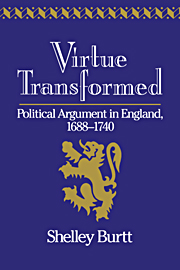Book contents
- Frontmatter
- Contents
- Acknowledgements
- 1 Introduction
- 2 The politics of virtue in Augustan England
- 3 A religious politics of virtue: Low Church Anglicanism and the Societies for Reformation of Manners
- 4 A republican politics of virtue: The selfish citizen in Cato's Letters
- 5 Bolingbroke's politics of virtue
- 6 The Court Whig conception of civic virtue
- 7 A world without virtue: Mandeville's social and political thought
- 8 Virtue transformed
- Bibliography
- Index
7 - A world without virtue: Mandeville's social and political thought
Published online by Cambridge University Press: 24 October 2009
- Frontmatter
- Contents
- Acknowledgements
- 1 Introduction
- 2 The politics of virtue in Augustan England
- 3 A religious politics of virtue: Low Church Anglicanism and the Societies for Reformation of Manners
- 4 A republican politics of virtue: The selfish citizen in Cato's Letters
- 5 Bolingbroke's politics of virtue
- 6 The Court Whig conception of civic virtue
- 7 A world without virtue: Mandeville's social and political thought
- 8 Virtue transformed
- Bibliography
- Index
Summary
Both Cato and the Court Whigs find themselves at odds with one version or another of what I have called the republican politics of public virtue. But they do not for this reason abandon civic virtue altogether, nor do they seek to explain how the polity might survive and flourish without excellences of the citizen. For the first attempt in this period to ground the good state independently of citizen virtue, civic or otherwise, we must look not to these authors, nor to others whose commitments might at times seem to merit the name liberal, but to the Augustinian politics of Bernard Mandeville.
Bernard Mandeville's Fable of the Bees was the first work of the eighteenth century to provide a comprehensive challenge to the various politics of virtue reviewed in the earlier chapters, and Mandeville's contemporaries fumed at its provocative conclusions. Its contents so scandalized a Middlesex Grand Jury that in 1723 they requested the Sheriff of London to take legal action against its publisher, Edmund Parker. The Fable, complained the Grand Jury, recommends “Luxury, Avarice, Pride and all kinds of Vices, as being necessary to Public Welfare” and portrays “Religion and Virtue as prejudicial to Society, and detrimental to the State.” This public rebuke naturally attracted a curious, and then outraged, audience for the new edition of a work that when first printed received almost no public notice at all. Far from assuring the book's demise, the Grand Jury's presentment simply provided the prelude to a barrage of criticism that quickly established the Fable as one of the most controversial works of its time.
- Type
- Chapter
- Information
- Virtue TransformedPolitical Argument in England, 1688–1740, pp. 128 - 149Publisher: Cambridge University PressPrint publication year: 1992

